 Thanks to partners NetGalley and Wednesday Books for the digital ARC of Eloisa James's Viscount in Love. The book will be published on July 23! I jumped on the chance to read Viscount in Love, drawn in by my previous experiences reading Eloisa James’s fun, feminist spins on regency romance. Viscount in Love fits right in. Torie Sutton is a bit of an outcast from her society—she’s never fit in the way her sister, Leonora does. Leonora is devoted to meeting others’ expectations, to following the rules and making a good match. And she’s succeeded in all of the above, nailing down an engagement with Viscount Dominic Kelbourne. Leonora, by contrast, doesn’t care much about fitting in and has had to accept others’ low opinions of her, driven—at least in part—by her inability to read. (It becomes clear early on that she has a reading disability, though this is of course before those were diagnosed.) When Dominic Kelbourne’s sister and her husband are killed, he’s left with their twins who are rebels and outcasts in their own right. And Leonora is having none of it. So, left without a partner, Dominic moves on to finding a caretaker instead—and Torie is the perfect candidate. Torie, though she deeply loves the twins, wants to be more than a nanny, and her resistance and Dominic’s persistence make for a fantastically fun historical romance.
0 Comments
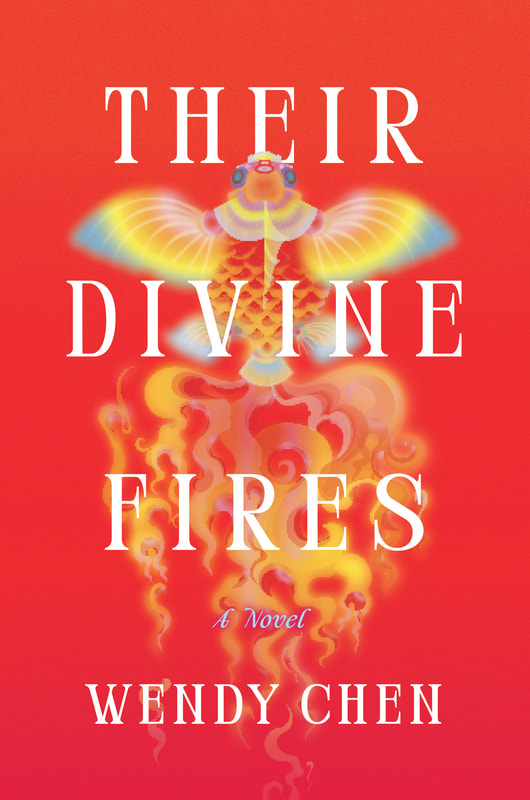 Thanks to partners NetGalley and Algonquin Books for the digital ARC of Wendy Chen’s Their Divine Fires. The book will be published on May 7! Wendy Chen’s Their Divine Fires comes in at only 256 pages, but that length is deceptive: this is a sprawling, multi-generational tale of three generations of Chinese women that takes the reader from 1917 Liuyang, China to 2009 Massachusetts, United States. Chen’s novel, inspired by the experiences of her own ancestors, begins with the story of a young girl, Zhang Yuexin, living with her family, including her two brothers, in Liuyang. Yuexin is devoted to her oldest brother, so when he cuts his traditional braid, angering her parents, Yuexin cuts her hair, as well. This initial symbolic event sets the stage for unrest: the family is broken when her oldest brother leaves to join the Revolution, setting them on a path that will have unexpected effects on them all. After her brother leaves, Yuexin’s young life is again altered forever when she saves Tan Haiyang, the young son of a local wealthy lord. He stays with the family while Yuexin’s father, a doctor, cares for him. Yuexin and Haiyang form a strong connection, but once he returns home, it seems likely that they’ll never see each other again, driven apart by the distance in their families’ situations. The only hope is that he felt the connection as strongly as Yuexin did. The narrative captures the effects of this Revolution, the ways that its aftermath cycles through the generations, moving through the Cultural Revolution of the 70s to the diaspora who make their way to the United States. Chen’s writing is stunning, and her sense of character is so vivid. Watching the way that early generations appear again later, the ways that ancestors affect their descendants, offers powerful commentary on the cycles of history. Despite the depth and power of its content, Their Divine Fires is a propulsive read, and I can’t recommend it enough. 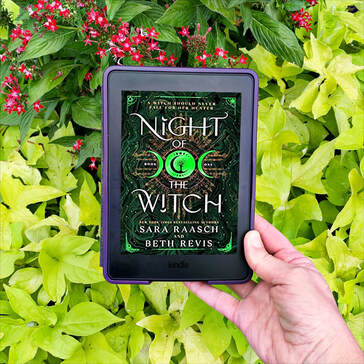 Thanks to partners NetGalley and Sourcebooks Fire for the digital ARC of Sara Raasch and Beth Revis's Night of the Witch. The book will be published on October 3! I absolutely loved Sara Raasch and Beth Revis's Night of the Witch, which uses a historical foundation to delve into the world of witches, witch hunts, and hexenjägers (hunters). The book opens in fourteenth century Germany with the decimation of Fritzi’s village as her mother, friends, and family are killed or imprisoned. Fritzi herself escapes after her mother hides her—against her will—in the basement, as Fritzi listens to the sounds of destruction and terror. When she realizes that her young cousin has been taken by Dieter Kirch, the head hunter, she vows to get her back, following the pack of hunters to the city that is their headquarters. Alternating chapters tell the story of Otto, a hunter who is Dieter’s second in command. Otto’s father was one of the earliest hunters, and his heritage has led him to the heights of the fervor. The hunters are plotting a spectacle, the burning of 100 witches, and Otto takes a small group out to arrest his sister, Hilde, to make her a part of the group. That’s where he meets Fritzi, who hears the ruckus and steps in to save Hilde. The writing and characterization here are gorgeous, and both Fritzi and Otto are nuanced figures who wrestle with their own responsibility in the face of their society’s manic attacks on anyone who lies outside the narrow path available to its citizens. Raasch and Revis raise questions about women’s power, about obligations to one’s community and the greater good, about the role of religion in morality. This is the first book in a series that I’ll definitely be continuing. 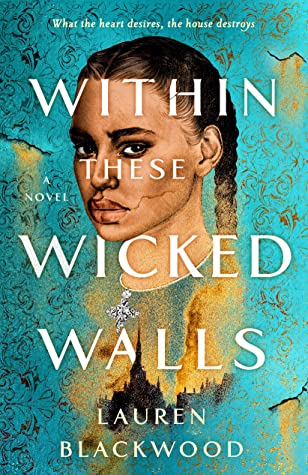 Thanks to partners NetGalley, St. Martin's Press, and Wednesday Books for the digital ARC of Lauren Blackwood’s Within These Wicked Walls in exchange for an honest review. The book will be published on October 19! Those of you who follow me know that I love a new version of a classic, and I’m particularly a sucker for a Jane Eyre retelling, so when I saw that there was a Jane Eyre retelling set in Ethiopia with a fantasy twist, I requested immediately. Wow, did Lauren Blackwood’s Within These Wicked Walls satisfy my every hope and expectation! This book does what the best retellings do: it takes its source material as inspiration and then spins out a new story and a new world. Here, the Jane character is Andromeda, a debtera—a type of exorcist—who can cleanse homes of the Evil Eye. In desperate straits after her mentor cast her out, Andromeda takes on a job at which ten other debteras have failed. She’s employed by the mysterious Magnus Rochester who lives in near-solitude at the far end of a desolate desert. All but a few servants and the nanny who raised him have abandoned him, apparently scared away by the curse no one can defeat. We experience the story through Andromeda’s eyes, and what a fabulous protagonist she is. Like Jane, she’s been raised in unusual circumstances, and her values differ from those of her world. She calls herself plain but cares little about her appearance. Instead, she values her strength and skills in her profession and communicates with a blunt honesty that shocks Magnus. He, in turn, is lacking social graces after having grown up as an outsider from his family and from society, so for a while, their bluntness seems to put them at odds. And then, of course, things change. I loved SO much about this story. Andromeda’s narrative voice is so much fun—I love her strength and her defiance of convention. Watching Magnus meet his match in Andromeda is so satisfying, and their chemistry is great. I also, however, appreciated the secondary characters: Saba, the silent and mysterious woman who takes joy in helping others; Jember, the debtera who raised Andromeda, whose complexity I found to be appealing; and even Kelela, the beautiful young woman who is Andromeda’s rival for Magnus’s affections. Most of all, I reveled in Blackwood’s development of the magic behind the curse that Andromeda is fighting. The way it manifests throughout Magnus’s estate is haunting and imaginative and creepy: it preys on characters’ compassion for others and on their unique weaknesses, and watching Andromeda strategize the best way to fight each new Manifestation shows her intelligence, her perseverance, and her strength. I was shocked to find out that Within These Wicked Walls is Blackwood’s debut, and it is certainly a confident, brilliant first novel. I can’t wait to see what she tackles next.  Thanks to partners NetGalley and Macmillan Children's Publishing Group, Roaring Brook Press for the digital ARC of Jennifer Mathieu’s Bad Girls Never Say Die in exchange for an honest review. The book will be published on October 19! I’m a huge fan of Jennifer Mathieu’s Moxie, which is a fabulous feminist YA novel—we had a great discussion about that one on Unabridged Podcast!—and of S. E. Hinton’s The Outsiders (though it’s been a while since I read it! Stay gold, Ponyboy). So, when I saw that Mathieu had a new book coming out that flipped The Outsiders to a female perspective, I was All. In. Did it work? Well, here’s what I loved. As in Moxie, Mathieu builds a compelling protagonist, a fifteen-year-old named Evie who struggles with the limited expectations of her 1964 Houston, Texas, society and of her mother and grandmother. They are thrilled that Evie’s sister is married, even though it means that she moved far away and is so, so lonely. They make it clear to Evie that she should aspire to do the same. But Evie wants more from her life. She wants choices. She wants to have friends who are tuff. She wants to think there’s a possibility that she can leave Houston. With her best friends—Connie, who is the toughest of them all; Juanita, Evie’s sweet neighbor; and Sunny, whose sweet sincerity has led her into a controlling relationship with her boyfriend—Evie has started skipping school and wearing makeup and defying anyone to challenge her group. I loved this part of the book, where we see exactly why Evie loves her friends so much, how much she wishes she could regain the close relationship with her mom and grandmother without limiting herself again, and the way Evie yearns for more without always being able to articulate exactly what “more” is. Then, everything changes. And Evie is caught up in a situation that being tough can’t get her out of. Mathieu beautifully depicts this world. There’s a huge disparity between the “tea sippers” of upper-class Houston and Evie’s own, lower socio-economic realm. Evie is a fabulously complex character, and we feel her connection to her friends, who step up to support her as much as they can. But at a certain point (and I can’t say much more without spoilers), I felt like the book became focused on unfurling certain plot elements—often connected to its origin story—to the detriment of its rich characters. While the book certainly shares some elements with The Outsiders, it was most successful for me when it stepped out on its own, exploring Evie’s life and the limitations she defied, again and again. Overall, though, this book is worth reading, and I would recommend it to students—this could be a foundation for many important discussions. 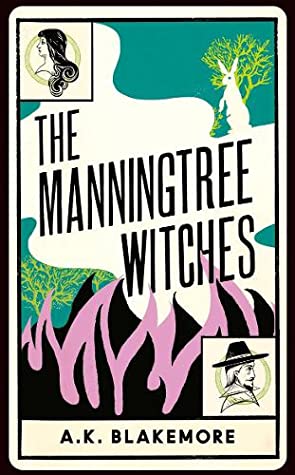 Thanks to Partners NetGalley and Catapult for the digital ARC of A. K. Blakemore’s The Manningtree Witches in exchange for an honest review. The book is out on Tuesday, August 10! I taught Arthur Miller’s The Crucible for a long time at the school where I used to teach, so I’ve dug into the Salem witch trials more than once. Parts of them still resonate: misogyny and class conflict, greed and corruption, and (of course) witch hunts both literal and metaphorical. Miller saw in the witch trials an allegory for the McCarthy trials and the obsession with unearthing communists in 1950s America, and they definitely can stand in for many modern obsessions. A.K. Blakemore’s The Manningtree Witches deals with witch trials in a 17th century English town, and while I’m sure there’s symbolic resonance there, too, it’s the sheer humanity of her novel that struck me. Through much of the book, the voice and point of view we’re following is that of Rebecca West, the daughter of a single mother who has spurned any chance of popularity by her irreverence, her cruelty, and her refusal to follow the rules of the town. Rebecca is more willing to please than her mother, but she’s got strength and independence of her own. Rebecca’s voice is vibrant and funny and wicked; her intelligence is apparent, as is her search for identity and love and comfort and companionship. When a stranger moves to town and begins asking questions about some animals who’ve died, some women who’ve miscarried, a boy who falls ill, it doesn’t take long before the town begins to catch his fervor, and, as always, it’s mostly women—and mostly single women—who are the focus. Rebecca loves her mother but doesn’t always like her, and so at first, the scrutiny satisfies her own cruel thoughts that result from her mother’s casual unkindness. But soon, Rebecca realizes that the accusations are insidious, weaving their way through the minds of the townsfolk. The events of the novel follow a familiar pattern, but their execution makes this a new and unique account. Blakemore builds brilliant characters who are trying to find small bits of happiness despite difficult circumstances, who revel in their friendships with other women who live lives similar to theirs. The writing is fantastic (I marked so many quotations!), and Rebecca feels just absolutely real. This is a confident, compelling debut novel, and I’ll definitely be looking out for Blakemore’s next book. 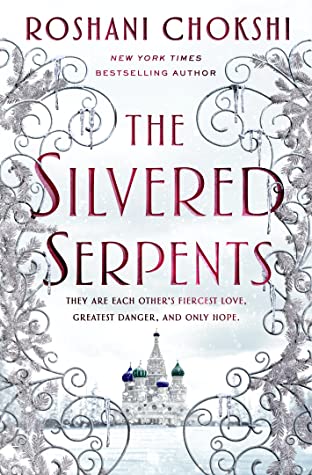 Thanks to Partner NetGalley for the digital ARC of Roshani Chokshi’s The Silvered Serpents in exchange for an honest review. The book will be published on Tuesday, September 22, 2020. ***PROCEED WITH CAUTION: SPOILERS FROM BOOK ONE, THE GILDED WOLVES, APPEAR. Roshani Chokshi’s The Silvered Serpents focuses again on the crew of Séverin as they come back together for another heist. After being driven apart by the loss of one of their own in book one, their trust has been fractured. Séverin is desperate to find The Divine Lyrics, a book that can make him a god, able both to protect his friends and to become impervious to being hurt by them or by their loss. Laila, too, wants to find the book--she believes it’s the only thing that can keep her alive. Enrique is desperate once again to prove himself: he has lost confidence since separating from his friends, unable to make his mark as an academic. And Zofia is ready to quit so she can be with her dying sister . . . until Séverin convinces her otherwise. As in The Gilded Wolves, the strengths here for me are the diversity of the group, who each come from different races, different countries, different classes, and different religions. Their disparate talents and ways of thinking mean that they can each contribute a unique strength to the group--and, of course, their magical talents are different, as well. The world here is one of a series of magical houses, unified in asserting their own superiority but also in competing against each other for new treasures and wealth and prominence, and each of the protagonists wants (or needs) something from the ruling class who runs the houses. There’s a cinematic quality to so many scenes within the novel--I love the different locations that Choskhi imagines so beautifully--and I like each of the characters and the personal challenges each is undergoing, as well. Shifting between the four points of view works well for me. I did wish for more from Séverin’s sections. I empathized with his grief, which has made it difficult for him to interact with his friends the way he used to, but I didn’t completely believe the personality change he underwent, and I wanted more from his chapters, which were my least favorite. I found Laila, Enrique, and Zofia each to be more believable and more nuanced. Overall, Roshani Chokshi’s The Silvered Serpents is a compelling story, a worthy sequel to The Gilded Wolves.
At the time, I'd read several other books by Kingsolver, and for some reason, I didn't enjoy The Poisonwood Bible. Since that time, I've remembered that--though I love Kingsolver--this book was my least favorite of hers. What was I thinking?! This novel blew me away. "Everything you're sure is right can be wrong in another place" (505). It's the story of the Prices, a missionary family from the Southern United States who travel to the Congo in 1959, completely unprepared for what they'll find. The women are the true stars of this narrative: mother Orleanna and the family's four daughters are dragged along by patriarch Nathan. The narrative alternates between those five distinct female characters--I could not believe how unique each voice was. I didn't even need the chapter headers to know who was speaking. The book, which covers decades, is wide ranging. Nathan, determined to convert the Congolese, can hear no voice and see no perspective but his own. He is both a realistic character and a symbol for the colonialism that has intruded on the Congo--first the Belgians, who maintain a presence despite their official surrender, and then the British, Americans, and Soviets, who each seek to maintain influence so they can take advantage of the country's resources. Nathan's family initially is so focused on the life they left that they can't see their own situation or the lives of those around them clearly. But as they continue to live in the Congo, they come to understand the type of power they lack and the ways that they can work around that absence to assert their independence in spite of it. Coming to know each woman here was my favorite part of this book--Kingsolver is such an amazing writer (I was employing my book darts liberally!), and though I found gorgeous sentences and thought-provoking ideas everywhere, I never confused Rachel's vanity and superficiality with Leah's toughness and determination to do what's right, or Ruth May's attempts to escape her birth-order fate as the youngest to move ahead with Adah's brilliant--and silent--determination to opt out of the demoralizingly mundane daily life of her family. Orleanna narrates her sections from decades after the Prices have left the Congo, and her reflection of what she lost and, perhaps, gained there gives her sections a resonance that is both painful and keen. "There is not justice in this world. Father, forgive me wherever you are, but this world has brought one vile abomination after another down on the heads of the gentle, and I'll not live to see the meek inherit anything. What there is in this world, I think, is a tendency for human errors to level themselves like water throughout their sphere of influence. That's pretty much the whole of what I can say, looking back. There's the possibility of balance. Unbearable burdens that the world somehow does bear with a certain grace" (522). Most of all, there's a beautiful sense of place here. Kingsolver--through research and travel to other parts of Africa (as she explains in her Author's Note)--communicates the brutality and eminence of nature, the ways that despite the Prices' attempts to control their world, it doesn't take long for the land of the Congo to erase the evidence of their existence. I could not have loved this book more, and I'm so glad to have the chance to be reminded, once again, that we never read the same book twice, that as we change, our responses to and understandings of the books we read necessarily change as well.
|
AuthorI'm Jen Moyers, co-host of the Unabridged Podcast and an English teacher. Archives
July 2021
Categories
All
|
Proudly powered by Weebly
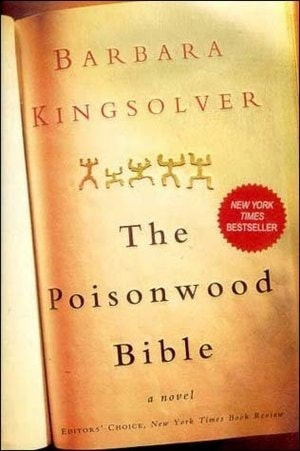
 RSS Feed
RSS Feed